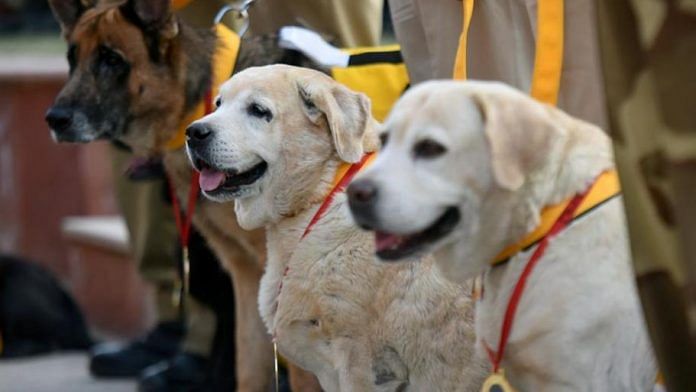New Delhi: A war memorial that is being planned in Meerut is set to feature a heroine who lost her life in a counter-insurgency operation in Kashmir in 2016.
It is also likely to feature some others who acquitted themselves creditably in the Kargil war India fought with Pakistan in 1999.
What makes the memorial unique is that it is devoted to service animals, mostly dogs, but also horses and mules. It will be the country’s first animal war memorial and recognise heroics on the battlefield, devotion to duty and outstanding contribution to military service alongside soldiers, three senior officers said, asking not to be named.
The memorial will come up at the Remount and Veterinary Corps (RVC) Centre and College in Meerut where the army breeds, rears, and trains dogs, mules and horses.
“Approval from the defence ministry is expected soon to construct a war memorial to commemorate RVC animals and men who have sacrificed their lives or have been commended for exceptional gallantry or distinguished service. Land has already been identified in Meerut and the preliminary design has been frozen,” said one of the officers.
He added that the monument would be similar to the National War Memorial in Delhi but on a smaller scale.
The names and service numbers of more than 300 dogs, 350 handlers and a few horses and mules will be inscribed on granite tablets at the memorial. The dogs include around 25 killed in action during counter-insurgency operations in Jammu and Kashmir and the country’s North-east, the first officer said.
“It will be a befitting token of remembrance and a mark of respect and gratitude towards the RVC soldiers (men and animals) who laid down their lives for the country. Several western nations have memorials dedicated to animals,” said the second officer.
Also read: No, the Indian Army does not kill its dogs after retirement
Topping the list of animals whose names will be inscribed on the memorial’s walls is Mansi, a Labrador who was posthumously “mentioned in dispatches” (the highest honour that a dog can get in military service in India) four years ago for her role in a counter-infiltration operation in north Kashmir, the second officer added.
Her handler, Bashir Ahmed War, was also posthumously awarded Sena Medal for gallantry and his name will be alongside Mansi’s.
The highest award won by a dog handler is the Shaurya Chakra, the country’s third highest peacetime gallantry award.
The army has more than 1,000 dogs, 5,000 mules and 1,500 horses.
Five Labradors were awarded commendation cards on Army Day 2020 for helping soldiers track down terrorists in J&K and sniffing out deadly explosives in the North-east last year.
Army dogs are trained for a variety of roles, such as detecting mines and explosives, tracking, assault, infantry patrol, and search and rescue.
“Explosives detection dogs are an invaluable component of road opening parties that safeguard the movement of men and material in terror hotbeds. These dogs have saved innumerable lives by timely detection of explosives. Mine detection dogs are used along the Line of Control to create safe lanes,” said the third officer.
The RVC pioneered war dog training in India in the late 1950s.
Labradors, German Shepherds and Belgian Shepherds (Malinois) are the mainstay of the army’s canine work force. The RVC has introduced some Mudhol Hounds (an indigenous dog breed from Karnataka) and Cocker Spaniels on a trial basis for explosives detection.
Recognising the contribution of animals, the army in 2017 named an officers mess lounge in Delhi cantonment after the longest serving army mule, Pedongi, who carried military loads in forward areas for over 30 years.
The army’s animal transport units, equipped with mules, are assigned the responsibility of supporting some of its remotest outposts located at heights of up to 19,000 feet. Mules played a crucial role during the 1999 Kargil war with Pakistan.
Also read: Uttarakhand Police gets a mongrel, and he’s better than any Labrador or German Shepherd



